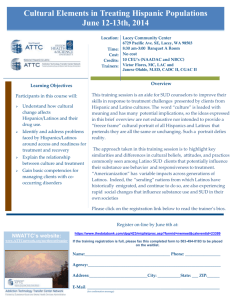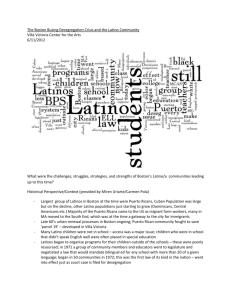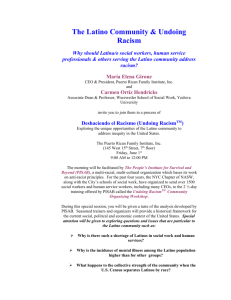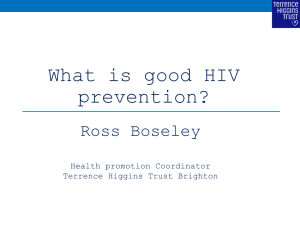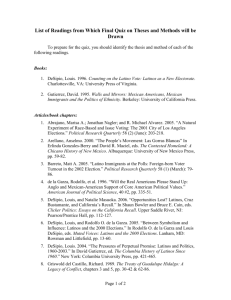Principal Investigators: Jorge Zepeda, ACSW, MSW – San Francisco
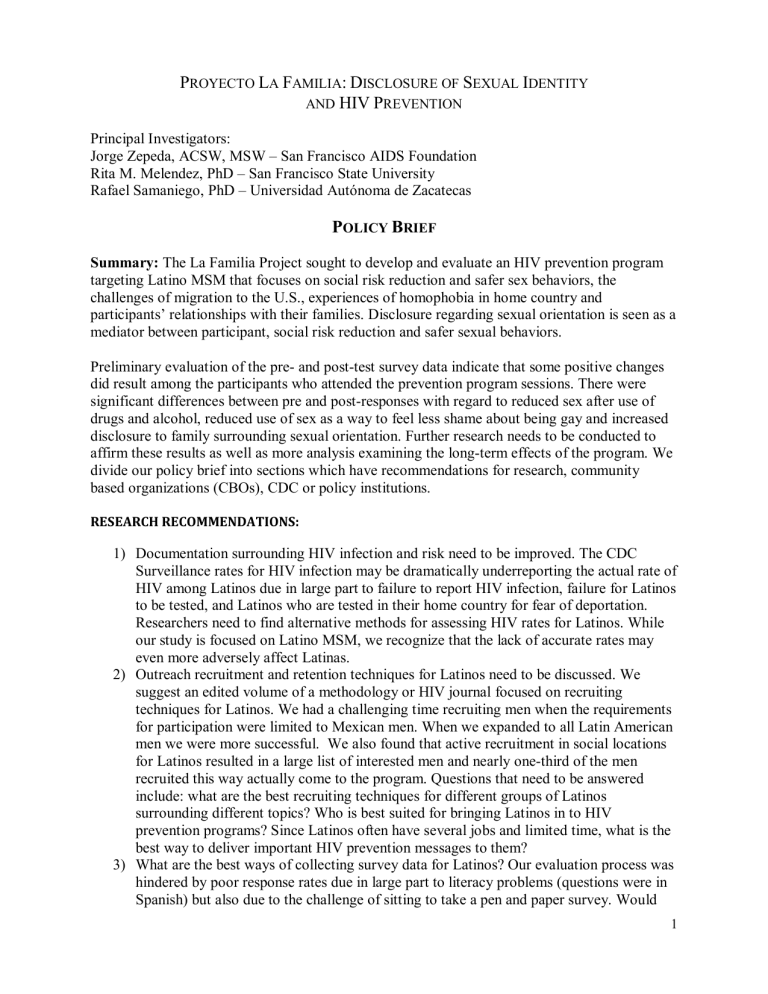
P ROYECTO L A F AMILIA : D ISCLOSURE OF S EXUAL I DENTITY
AND HIV P REVENTION
Principal Investigators:
Jorge Zepeda, ACSW, MSW – San Francisco AIDS Foundation
Rita M. Melendez, PhD – San Francisco State University
Rafael Samaniego, PhD – Universidad Autónoma de Zacatecas
P OLICY B RIEF
Summary: The La Familia Project sought to develop and evaluate an HIV prevention program targeting Latino MSM that focuses on social risk reduction and safer sex behaviors, the challenges of migration to the U.S., experiences of homophobia in home country and participants’ relationships with their families. Disclosure regarding sexual orientation is seen as a mediator between participant, social risk reduction and safer sexual behaviors.
Preliminary evaluation of the pre- and post-test survey data indicate that some positive changes did result among the participants who attended the prevention program sessions. There were significant differences between pre and post-responses with regard to reduced sex after use of drugs and alcohol, reduced use of sex as a way to feel less shame about being gay and increased disclosure to family surrounding sexual orientation. Further research needs to be conducted to affirm these results as well as more analysis examining the long-term effects of the program. We divide our policy brief into sections which have recommendations for research, community based organizations (CBOs), CDC or policy institutions.
RESEARCH RECOMMENDATIONS:
1) Documentation surrounding HIV infection and risk need to be improved. The CDC
Surveillance rates for HIV infection may be dramatically underreporting the actual rate of
HIV among Latinos due in large part to failure to report HIV infection, failure for Latinos to be tested, and Latinos who are tested in their home country for fear of deportation.
Researchers need to find alternative methods for assessing HIV rates for Latinos. While our study is focused on Latino MSM, we recognize that the lack of accurate rates may even more adversely affect Latinas.
2) Outreach recruitment and retention techniques for Latinos need to be discussed. We suggest an edited volume of a methodology or HIV journal focused on recruiting techniques for Latinos. We had a challenging time recruiting men when the requirements for participation were limited to Mexican men. When we expanded to all Latin American men we were more successful. We also found that active recruitment in social locations for Latinos resulted in a large list of interested men and nearly one-third of the men recruited this way actually come to the program. Questions that need to be answered include: what are the best recruiting techniques for different groups of Latinos surrounding different topics? Who is best suited for bringing Latinos in to HIV prevention programs? Since Latinos often have several jobs and limited time, what is the best way to deliver important HIV prevention messages to them?
3) What are the best ways of collecting survey data for Latinos? Our evaluation process was hindered by poor response rates due in large part to literacy problems (questions were in
Spanish) but also due to the challenge of sitting to take a pen and paper survey. Would
1
computer assisted techniques work better and how can small organizations get financial backing to purchase the necessary equipment and software?
4) PIMSA research projects should be funded for at least 2 years, in order to allow for design, intervention, and follow-up to be conducted in both countries so that final results can have an impact, in similar conditions, on both sides of the border.
5) A network for collaboration should be established among PIMSA grantees who have researched diverse areas of migration so that experiences and/or new ecological research methods in migration and health can be explored and shared.
RECOMMENDATIONS FOR COMMUNITY-BASED ORGANIZATIONS
1) Increased services for Spanish-speaking Latino MSM are needed. Latino men need HIV prevention services and community-based organizations have a unique ability to serve them. However, service to Latino MSM requires more than one Spanish speaking employee and may require a dramatically different approach to outreach, recruitment, marketing and implementation of services. As our recruitment experience indicates, service providers need to be open and persistent in reaching out to Latino MSM. They must provide Spanish language services but also provide a space where Latinos feel welcome and understood which may include assistance with work, housing, migration documentation among others.
2) Focus groups to discuss role of family in behaviors. Much of the information used as a basis for the study first emerged in support groups with Latino MSM. Later research verified the importance of disclosure with regard to safer sex. CBOs, many of which already have HIV prevention programs in place, may use focus groups as a way of assessing the needs of their Latino clients and if they need to incorporate added features to their programs. For example, if they already have an HIV prevention program for
Latinos, they may want to include the family as an area of discussion. If they do not have an HIV prevention program targeting Latinos, they may want to use a focus group with
Latinos to examine the need and desire for such a group.
3) DEBIs which are distributed from the CDC for use in many CBOs may be altered to include an exercise or section where the family is discussed in relation to the lives of
Latino MSM.
4) For Zacatecas, the Department of Health Sciences of the UAZ should establish and encourage the formation, training, and continuous education on topics such as identity and gender, sexual diversity, tolerance, social risk reduction and increase of safer-sex behavior, family and health, awareness of HIV, support and coordination with vulnerable populations, among others. These activities would be implemented with students at all university levels (bachelor, masters, and doctorate) in order to create professionals dedicated to the attention and work of these types of social problems.
5) For Zacatecas, a collaboration between the UAZ and other centers and department within the Secretary of Health should be established to detect (in rural, semi-urban, and urban areas of Zacatecas) those cases where disclosure between parents and sons represents a point of attention and intervention so that these people can attend groups or networks where they can receive support, orientation, and advice. This would lead to the development of protective health behaviors, lessen the homophobia and rejection experienced by those with a different sexual orientation, and allow families to play a socially supportive role when and if migration becomes an option for MSM.
2
RECOMMENDATIONS FOR CDC, MEXICAN PUBLIC HEALTH INSTITUTIONS AND FUNDING
AGENCIES IN THE U.S. AND MEXICO
1) Creation of stand-alone segments that are not part of a DEBI but can be used in conjunction with DEBIs. This will keep DEBIs (many of which were created and tested decades ago) fresh with new ideas and pertinent to the lives of Latino MSM.
2) Statements on their surveillance data that indicate that the number of HIV infection rates may be higher than reported due to the migration issue and lack of documentation among many Latinos in the US.
3) Researcher and service providers should have longer length of time to implement a research or program dedicated to the Latino immigrant community, because the IRB approval and/or legal protection set up (in order to protect confidentiality) takes longer that other projects working with non-immigrant communities in the United States
4) Researcher and service providers should have longer length of time to implement a research project, program or service dedicated to the Latino immigrant community, because outreach, recruitment and retention of Latino/a immigrants is more difficult than recruiting other non-immigrant communities.
5) Researcher and service providers should have longer length of time and additional funding to implement a research project, program or service dedicated to the Latino immigrant community, because the implementation of concepts require multiple translations from English to Spanish and Spanish to English. In addition, editing of documents needs specialized professionals to assist in the translation and editing process.
6) Research and program development funding should be increased for HIV prevention,
Health Services and Social Service support for Latino/as in order to decrease the number of new infections among Latino MSM.
7) Research and program development funding should increase as well for collaborations with Universities from Mexico in order to develop home-grown interventions assuring appropriate HIV prevention and health care intervention for the Latino immigrant communities traveling and crossing the US-Mexico borders on an ongoing basis
8) Mexican institutions dedicated to HIV prevention and HIV care need to allocate resources and integrate interventions (individual and group level) to assist LGBT community members (living or at risk of HIV) to achieve their self and family acceptance by decreasing social stigma and increasing sexual disclosure.
9) Human Rights offices in Zacatecas should assist MSM in Zacatecas who feel physical at risk as a result of their perceived sexual identity or disclosed sexual orientation and/or sexuality.
10) Police departments in Zacatecas should be trained on Sexuality and Gender topics and their role in protecting Zacatecanos who are MSM.
11) The DIF (Desarrollo Integral de la Familia) should offer services for parents and siblings in disclosing sexual orientation.
12) The National Health Services, such as CENSIDA, CONASIDA, SEGURO SOCIAL and
DIF should develop printed materials and media campaigns to assist MSM and their family members to achieve acceptance and increase knowledge on the impact of family on the overall health of MSM and its direct relationship with levels of acceptance and
HIV risk.
3
